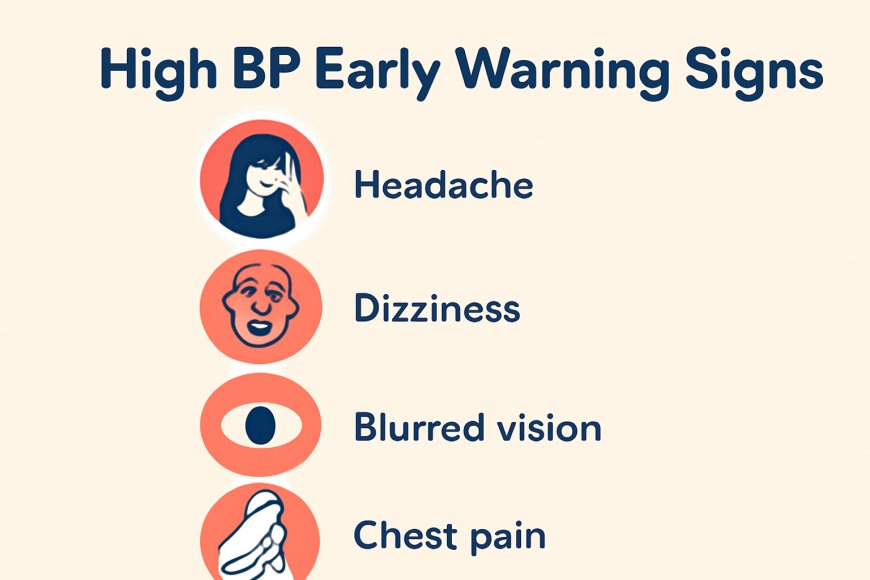High BP Early Warning Signs and What to Do Next
Discover early warning signs of high blood pressure and learn effective management tips. Stay informed for a healthier life

High blood pressure, or hypertension, is often dubbed the silent killer.Many individuals may live for years without realizing they have high BP, as it usually presents with minimal or no symptoms. Ignoring it can lead to severe health complications such as heart disease, stroke, and kidney failure. That’s why recognizing early warning signs is crucial!
In this article, we’ll explore the early warning signs of high blood pressure, what you can do next, and some practical strategies for managing your health. If you’re looking to stay informed and proactive about your well-being, you're in the right place! Let’s dive in!
Recognizing the Early Warning Signs of High Blood Pressure
Understanding the early warning signs of high blood pressure can help you take immediate action. Here are some common symptoms to watch for:
Fatigue and Confusion
Unusual tiredness or a sense of confusion can be linked to high blood pressure. This can occur due to decreased blood flow to the brain and body. If you find yourself feeling fatigued without reason, it’s an indicator to check your blood pressure.
Headaches
Persistent headaches, particularly those occurring in the morning, can signal elevated blood pressure levels. While headaches can be caused by various factors, frequent occurrences in conjunction with other symptoms should prompt a check-up.
Vision Problems
Blurred or double vision can be a sign of hypertensive retinopathy, a condition caused by damage to the blood vessels in the eyes. If you experience sudden changes in vision, it’s essential to consult with a healthcare professional immediately.
Shortness of Breath
Difficulty breathing or shortness of breath during normal activities can indicate high blood pressure. This symptom can indicate that your heart is struggling to pump blood effectively, which is a serious concern.
Nosebleeds
Frequent nosebleeds, especially when they occur without a clear cause can be linked to hypertension. While not a definitive sign, recurrent nosebleeds can indicate underlying health issues that warrant further investigation.
What to Do Next: Immediate Steps to Take
If you notice any of the warning signs mentioned above, it’s essential to take action. Here’s what you can do next:
Get Your Blood Pressure Checked
The first step in managing high blood pressure is knowing your numbers. You can check your blood pressure at a pharmacy, a doctor’s office, or even invest in a home monitor. A normal reading is generally considered to be below 120/80 mmHg.
Consult a Healthcare Professional
If your blood pressure readings are consistently high, or if you are experiencing concerning symptoms, schedule an appointment with your healthcare provider. Your doctor may perform tests to determine the cause of your high blood pressure and recommend treatment options.
Lifestyle Changes
Adopt a heart-healthy diet rich in fruits, vegetables, whole grains, and lean proteins. The DASH diet (Dietary Approaches to Stop Hypertension) is specifically designed to combat high blood pressure. Regular physical activity can help lower blood pressure. Aim for at least 150 minutes of moderate-intensity exercise each week. Maintaining a healthy weight can significantly impact your blood pressure. Even a small weight loss can make a difference.
Monitor and Manage Stress
Stress can contribute to high blood pressure. Practices such as yoga, meditation, and deep-breathing exercises can help reduce stress levels. Regularly managing your stress can lead to improved overall health and lower blood pressure.
Common Myths About High Blood Pressure
Understanding high blood pressure also means debunking common myths. Here are a few misconceptions:
Myth 1: Only Older Adults Get High Blood Pressure
High blood pressure can affect individuals of all ages. Early lifestyle choices can greatly impact blood pressure levels later in life.
Myth 2: High BP Has No Symptoms
While many people don't experience noticeable symptoms, some may face clear warning signs. Regular monitoring is essential.
Myth 3: Medication is the Only Solution
While medication can be necessary, lifestyle changes play a critical role in managing high blood pressure effectively.
Also Read This
10 Foods That Lower Blood Pressure Naturally.
FAQs
Q1: Can high blood pressure be cured?
While there is no outright cure for high blood pressure, it can be effectively managed with lifestyle changes and, if necessary, medication.
Q2: How often should I check my blood pressure?
For those with normal blood pressure, check it at least once every two years. If you have high blood pressure or are at risk, check more frequently as advised by your doctor.
Q3: What are the long-term effects of untreated high blood pressure?
Untreated high blood pressure can lead to severe health issues, including heart disease, stroke, kidney damage, and vision loss.
Q4: Can stress really affect blood pressure?
Yes, chronic stress can contribute to high blood pressure. Effective stress management techniques can help mitigate this effect.
Q5: Is it safe to exercise with high blood pressure?
In most cases, yes. Regular physical activity is beneficial for managing high blood pressure. However, consult with your healthcare provider for personalized recommendations.
Conclusion
High blood pressure may be a common health issue, but recognizing its early warning signs and taking proactive steps can significantly impact your life. Regular monitoring, lifestyle changes, and consulting with healthcare professionals are essential strategies for managing your blood pressure effectively.
Remember, staying informed is your best defense against this "silent killer." For more health-related insights, be sure to visit pakrepublic.com, where we provide a wealth of information to help you lead a healthier life. Stay vigilant, and take charge of your health today




















































